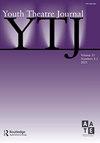Going to “The Land of Drama”: Behavior management techniques in a kindergarten sociodramatic play residency
Q1 Arts and Humanities
引用次数: 0
Abstract
ABSTRACT This study examined the impact of educational drama on behavior management techniques used by Teaching Artists (TA’s) during a guided sociodramatic play residency. Four TA’s, two males and two females, teaching a total of eight Kindergarten classrooms were observed on videotape to see how they managed student behavior during the first lesson and the last lesson of a guided sociodramatic play residency. Four categories were coded for: no management, directive management, supportive management, and mixed management. There was a statistically significant difference reduction in the amount of directive behavior management employed by the TA’s between Lessons 1 and 13. The preliminary results indicate that further empirical study be done on the direct of effects of educational drama on self-regulation development in children. This may reflect an increase in children’s self-regulation over time, perhaps as a function of the sociodramatic play activities. Direct, experimental examination of children’s behavioral change during drama residencies are warranted. As the need for teamwork skills and effective communication is vital in school, self-regulated behavior is imperative for academic achievement and social competency, and educational drama may have an impact on gaining these skills.去“戏剧的土地”:幼儿园社会戏剧戏剧实习的行为管理技巧
摘要本研究考察了教育戏剧对教学艺术家(TA)在社会戏剧指导驻留期间使用的行为管理技术的影响。四名助教,两男两女,总共教了八个幼儿园教室,通过录像带观察他们在第一节课和最后一节课上如何管理学生的行为。分为四类:无管理、指示管理、支持管理和混合管理。在第1课和第13课之间,助教使用的指导性行为管理的数量有统计学上的显著差异。初步结果表明,教育戏剧对儿童自我调节发展的直接影响有待进一步实证研究。随着时间的推移,这可能反映了儿童自我调节能力的增强,这可能是社会戏剧游戏活动的作用。在戏剧驻留期间,对儿童行为变化进行直接的实验性检查是必要的。由于团队合作能力和有效的沟通能力在学校是至关重要的,自我调节的行为对于学习成绩和社会能力是必不可少的,而教育戏剧可能对获得这些技能有影响。
本文章由计算机程序翻译,如有差异,请以英文原文为准。
求助全文
约1分钟内获得全文
求助全文
来源期刊

Youth Theatre Journal
Arts and Humanities-Visual Arts and Performing Arts
CiteScore
0.60
自引率
0.00%
发文量
1
 求助内容:
求助内容: 应助结果提醒方式:
应助结果提醒方式:


